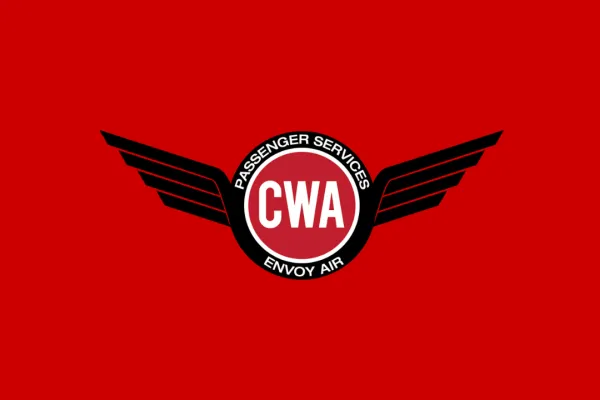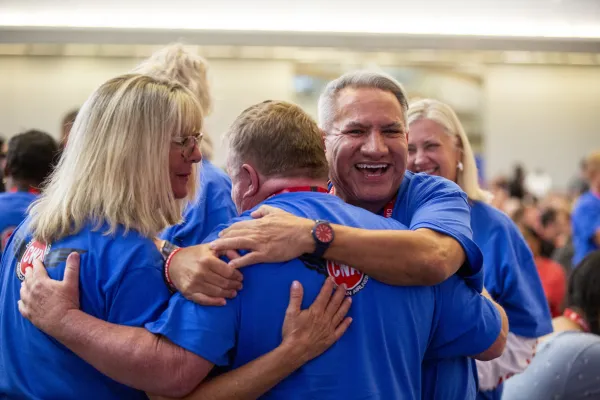What's at Stake: Talking to Piedmont and Envoy Agents
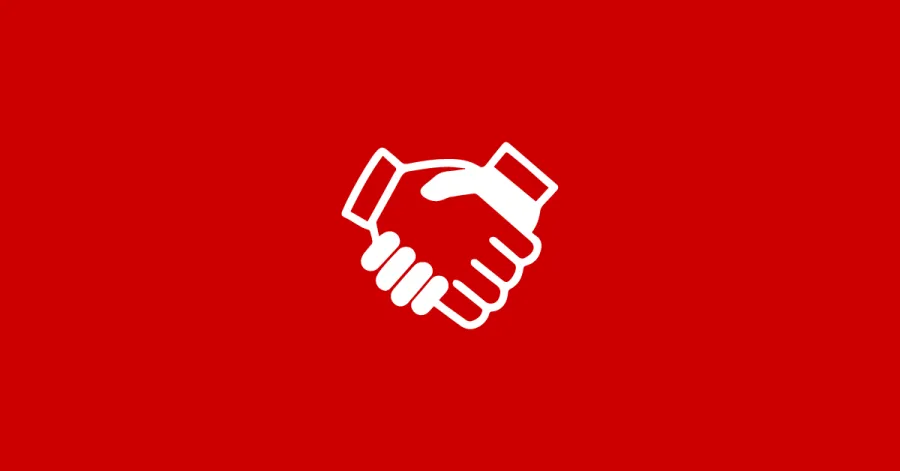
Takisha Gower, Envoy, DFW
"Why Does American Airlines Demand So Much of Envoy Agents, But Pay Us So Little?"
Takisha Gower is a 17-year veteran passenger service agent at Envoy. She started in Chicago and moved to Dallas in 2014. After 17 years, Takisha earns $15.71 an hour.

As a single mother with five kids, it’s been rough. I work extremely long hours, and I’ve had to take emergency loans, borrowing against my retirement account, to survive. It’s not a good cycle: You’re robbing Peter to pay Paul, and no matter how many hours you work, it’s hard to get ahead.
My question after all these years is: Why does American Airlines demand so much of Envoy agents, but pay us so little?
We have agents working 60 hours a week at Envoy and working other jobs too. We have agents in loving marriages who had to divorce so they could qualify for public assistance because they couldn’t feed their families otherwise. The only way I survived after my husband passed away in 2008 was because I received some Social Security benefits for my daughters after his death.
Hard Choices
I tried to get assistance for preschool child care before my youngest was old enough for kindergarten. Preschool cost $125 a week, which took a lot of my wages, but they said I made too much to qualify. I had to leave my son with my parents in Chicago so that I could work more hours at DFW.
I worked at least 60 hours a week and kept that up for five months, but it took a toll on us to be apart. So many people are doing the same thing—working constantly until their bodies just give out. When you get a day off, you end up just sleeping the whole day away to recover.
There’s no reason for us to be paid so little. Everyone doing this work deserves decent pay, and American Airlines can afford it.
John “J D” Colwell, Piedmont, CLT
“No One Who Works Here Can Afford to Do Anything But Work.”
John Colwell has worked for Piedmont for 11 years, and for most of his career he’s been a ramp agent. After more than a decade with the company, he makes just $13.48 an hour.
[caption align="left"]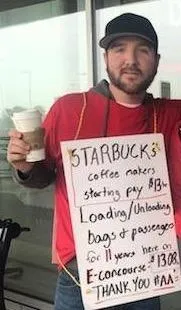
When I first started working here, there were some folks who came to Piedmont at the top of their game. They were active in their communities and churches and spent a lot of time with their friends and family. Nowadays it's just a given that they are going to miss their kids’ soccer or basketball games or birthday parties; and they’re exhausted all the time. No one who works here can afford to do anything but work. I can't afford to start a family because I work here.
A fair contract with livable wages would mean so much to everyone. After all my time with Piedmont, I’m actually making less per hour than I was as a lifeguard in high school. I see some other agents who are working 70 or 80 hours a week to try to make it, and they’re sleep-deprived, depressed, and angry because their hard work does not pay off. The hours they have to put in because the pay is so low mean that this job is literally stealing people’s lives.
Heartbroken Workers
Here’s the bottom line: This blue-collar workforce is heartbroken. We get no respect on the job, and the pay is so low we get disrespected off the job, too. All we see is executives high fiving one another and getting huge bonuses, while consciously making decisions to keep their own workforce underwater. It’s infuriating.
I wish that more of my co-workers could see that they are the union and the union is them.
I want to tell people that it all boils down to respect. All of it. We deserve respect as human beings first and as employees second.
Robert Helmstetler, Envoy, DFW
“People are Envoy’s Most Valuable Investment.”
Robert Helmstetler is a passenger service agent who has worked for Envoy for about 9 months and makes $9.50 an hour.
[caption align="right"][/caption]Right now, to be honest, I haven’t really made any money in the 9 months I’ve worked at Envoy. The money I make all goes to pay my health insurance premiums. I work three other jobs to support my family—including being on the road as a wellness nurse. It’s kind of ironic that my nursing job doesn’t offer me any health insurance, so that’s one reason I’m at Envoy. I work weekend shifts, clocking 30-40 hours between Friday and Sunday. In total, I usually end up at about 100 hours a week between all my jobs.
Even though I’m new at Envoy, the airline industry is a family enterprise. My Dad retired from American and a couple of my relatives currently work there. But I can’t believe how different it is for me than it was for my Dad. He was able to cover our whole family of seven kids on his health plan and still support us with decent take-home pay. For me, I basically have to work 30 hours a week in order to cover insurance for myself, my wife, and our daughter—and there’s nothing left in my paycheck after that.
I don’t like spending so much time away from home. My daughter is only six, and she doesn’t want me to leave. I wish management would understand the position we’re in, and what a difference it would make if we had higher wages and lower health insurance premiums.
People Are an Investment
Here’s what I’d say to management: People are Envoy’s most valuable investment. You are only as good as the way you treat your staff. I’ve yet to hear passengers talk about how great their seats and tray tables are. The true heroes of the industry are the employees who go above and beyond, and passengers remember their flying experience when the employees are great. Invest more in workers and you’ll eliminate high turnover and see your workers do great things.
Douglas Christian, PIedmont, CLT
“We have to speak the truth: These are poverty wages, and we need a fair contract.”
Douglas Christian spent 21 years in the military before joining Piedmont almost 3 years ago as a ramp agent in Charlotte. He currently makes $10.40 an hour.
[caption caption="Douglas Christian, Piedmont" align="right"]Douglas Christian, Piedmont[/caption]I grew up in Detroit in a UAW household, so I know mobilization and a good union contract are important.
[caption align="left"]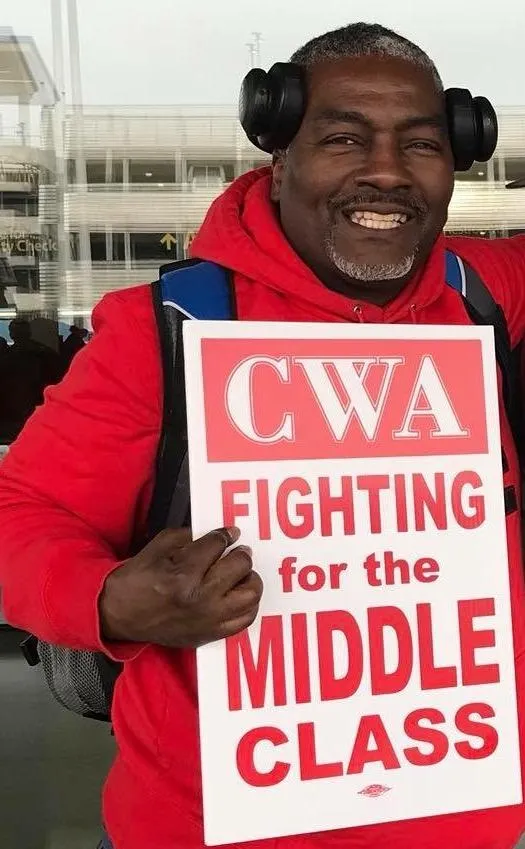
As ramp agents, we’re out there handling passengers’ heavy luggage and bringing in and pushing out planes in a timely manner no matter what the weather conditions are. We deal with million-dollar equipment and hazardous conditions sometimes, so we end up with injuries. We’re always shorthanded and that also leads to difficult situations. If you’re working that many hours, it just makes the job even more dangerous because your body is so beat up and worn down.
I believe in this fight. I talk to younger workers and try to take them back to what life was like for their grandparents and great grandparents, before unions. I tell them that people picketed and boycotted and went on strike in the past, so that today we can raise our voices without being afraid of what will happen. We can speak the truth, “These are poverty wages, and we need a fair contract.”
I’d like to ask management at American and Piedmont why they don’t want to take care of their employees. Low wages mean high turnover, so you can’t get any cohesiveness among your workers and morale is very low. If wages were higher and benefits were better, the company would get a great return on that investment.
And I’d say to everybody at Piedmont: Working together works! I’m going to keep fighting until we get a good contract because we all have to care. We have to use our voices to make things happen.
CWA Member Survey Improves FAA Reauthorization Bill

